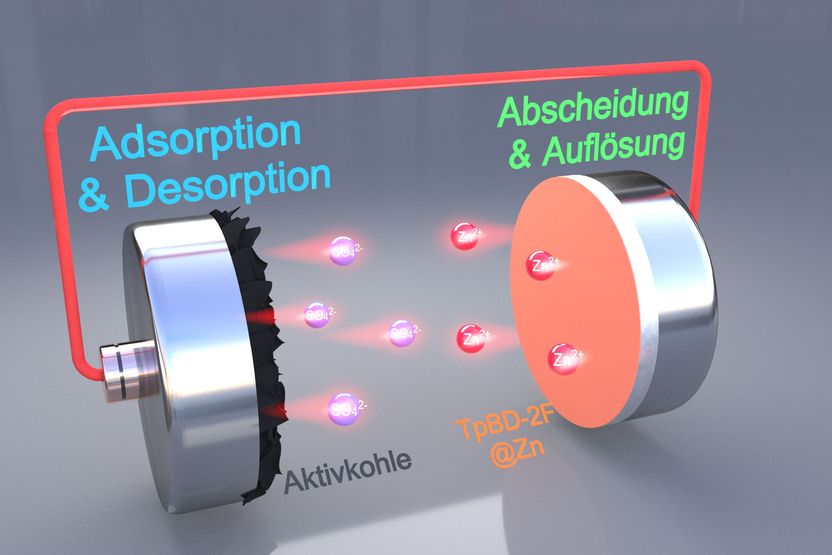Life of zinc batteries drastically extended
Improvement to several 100,000 loads
The switch to renewable energies requires efficient methods for storing large amounts of electricity. Researchers at the Technical University of Munich (TUM) have developed a new method that could extend the service life of aqueous zinc-ion batteries by several orders of magnitude. Instead of a few thousand, they should be able to withstand several 100,000 charging and discharging cycles in future.

Researchers at the Technical University of Munich (TUM) have developed a new method that could extend the service life of aqueous zinc-ion batteries by several orders of magnitude. Instead of a few thousand, they should be able to withstand several 100,000 charging and discharging cycles in future. The key to this innovation is a special protective coating for the zinc anodes of the batteries.
Da Lei / TUM
The key to this innovation is a special protective layer for the zinc anodes of the batteries. This layer solves previous problems, such as the growth of needle-shaped zinc structures - known as zinc dendrites - as well as undesirable chemical side reactions that trigger hydrogen formation and corrosion.
The researchers led by Prof. Roland A. Fischer, holder of the Chair of Inorganic and Organometallic Chemistry at the TUM School of Natural Sciences, use a special material for this purpose: a porous organic polymer called TpBD-2F. This material forms a stable, wafer-thin and highly ordered film on the zinc anode, which allows the zinc ions to flow very efficiently through nano-channels and at the same time keeps water away from the anode.
Zinc batteries as a cost-effective replacement for lithium-ion batteries
Da Lei, PhD student and first author of the research paper published in the journal "Advanced Energy Materials", explains: "Zinc-ion batteries with this new protective layer could replace lithium-ion batteries for large-scale energy storage - for example in combination with solar or wind power plants. They last longer, are safer and zinc is also cheaper and more readily available than lithium." Lithium remains a first choice for mobile applications such as electric cars or portable devices, but the higher costs and environmental impact make it less attractive for large-scale use in energy storage.
Prof. Roland A. Fischer adds: "This is a truly spectacular research result. We were able to show that the chemical approach devised by Da Lei not only works, but can also be controlled. As basic researchers, we are particularly interested in new scientific principles - and we have discovered one here. We have already developed an initial prototype in the format of a button cell. I see no reason why our findings cannot be transferred to larger applications. Now it's up to engineers to take up the idea and develop suitable production processes."
---
Did you already know? On November 13, virtual battery day 2024 will take place - the largest digital event on battery technology and electrochemical energy storage! Find out more now and join for free: https://www.virtual-battery-day.com/en/what-to-expect-as-visitor
Note: This article has been translated using a computer system without human intervention. LUMITOS offers these automatic translations to present a wider range of current news. Since this article has been translated with automatic translation, it is possible that it contains errors in vocabulary, syntax or grammar. The original article in German can be found here.
Original publication
Da Lei, Wenzhe Shang, Lyuyang Cheng, Poonam, Waldemar Kaiser, Pritam Banerjee, Suo Tu, Olivier Henrotte, Jinsheng Zhang, Alessio Gagliardi, Joerg Jinschek, Emiliano Cortés, Peter Müller‐Buschbaum, Aliaksandr S. Bandarenka, Mian Zahid Hussain, Roland A. Fischer; "Ion‐Transport Kinetics and Interface Stability Augmentation of Zinc Anodes Based on Fluorinated Covalent Organic Framework Thin Films"; Advanced Energy Materials, 2024-10-13
Other news from the department science
Most read news
More news from our other portals
See the theme worlds for related content
Topic World Battery Technology
The topic world Battery Technology combines relevant knowledge in a unique way. Here you will find everything about suppliers and their products, webinars, white papers, catalogs and brochures.

Topic World Battery Technology
The topic world Battery Technology combines relevant knowledge in a unique way. Here you will find everything about suppliers and their products, webinars, white papers, catalogs and brochures.



























































